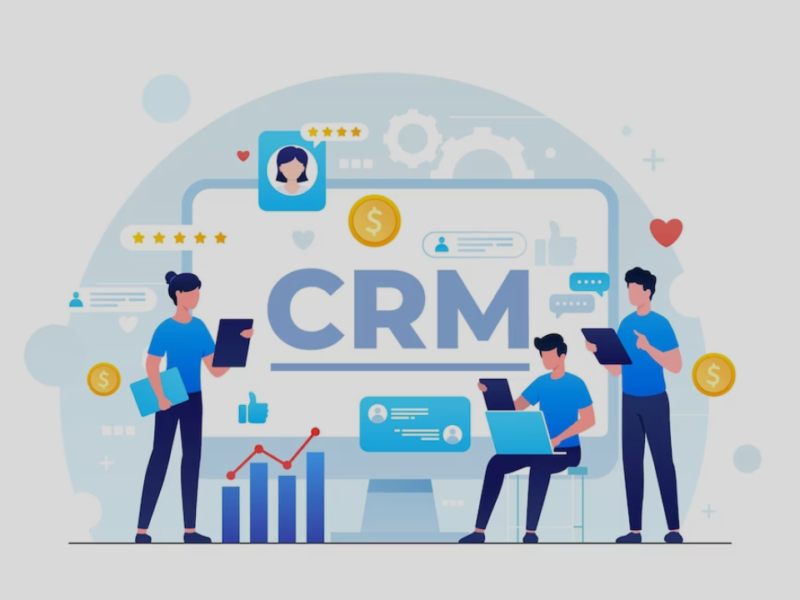The world of customer relationship management (CRM) has undergone a transformational shift after the emergence of the internet, followed by social media platforms.
We still remember the days when phone lines were jammed and emails went unanswered as soon as any brand faced a crisis. Due to the one-way communication channel, where the power of communication was with the brand, businesses could control the conversation around any crisis. Not anymore.
The world of social media has transformed how CRM activities are handled in an organization. It is mainly because of two reasons. One: With the entry of social media platforms, consumers now have a platform to air their experiences and discuss them with their network. Two: Close to 4.26 billion people will be using social media in 2021. This number is expected to further go up to 5.85 billion in 2027
Source: Statista
Over half of the global population of 7.98 billion is present on social media networks, and brands cannot miss an opportunity to take a proactive approach. At the same time, many customers share their thoughts, experiences, and expectations from brands on these social media networks. It makes it all the more important for brands to engage, understand, and react.
As a result, the concept of social CRM came into being. It is an extension of traditional CRM with a layer of social media built into the system, which is used for measurement, engagement, and understanding of customer sentiment.
Here is all you need to know about Social CRM:
What is Social CRM?
Social CRM is the integration of social media into the CRM efforts of an organization. The use of social CRM allows a business to use social media for various objectives, like better engagement with customers, increased analysis, lead generation, and better customer service.
As social CRM tools can integrate with traditional CRM solutions, brands can gain better insights and provide better customer service. As a large part of customer feedback exists on social media platforms, brands must integrate social CRM as part of their customer service efforts.
For instance, UK-based telecom giant BT claims that close to 40% of feedback about the brand originates from Twitter. It is a similar story to that of most other brands. It can be Facebook for some, Instagram for others, or LinkedIn for others. Consumers discuss, share, and even post their complaints on social media platforms.
If left unattended, the feedback on social media platforms can cause damage to brand equity and create a big hole in the customer service strategy for the organization. On the other hand, tracking these social interactions and integrating them with the existing customer service team to provide faster and more complete resolutions to customers is better.
According to Erik Qualman, “We don’t have a choice on whether we do social media. The question is how well we do it.”
Watch out: Exploring the Future of Social CRM-Key Trends for 2023
Traditional CRM vs. Social CRM
Traditional CRM is very different from social CRM in many ways. Here are the key differences between traditional CRM and social CRM:
Central Strategy
Traditional CRM is built to collect, manage, and act on customer data. In other words, the transactions in a traditional CRM are mostly transactional. It can be a sales rep trying to close a deal or an agent resolving a customer query.
On the other hand, a social CRM is not built on the concept of hard selling. It is designed to achieve better customer engagement and better exposure for the brand. Social CRM systems work towards generating consumer interest in the brand and use other trending topics to gain customer attention.
Customer interaction
The business controls customer interaction flow with predefined communication channels, time slots, and expected outcomes. On the other hand, social media puts the power in the hands of the customer, who is free to initiate a conversation about any brand at any given time or place.
Communication
Data mainly drives communication in a traditional CRM. It can be emails, calls, or messages. On the other hand, communication in a social CRM is driven by content. It can be messages, posts, or blogs.
Why does Social CRM Matter?
Social CRM is important mainly because of the importance of social media in the daily lives of customers. Here are the key reasons why social CRM matters for business:
The social media user base
As mentioned, over half of the global population is present on social media platforms. With such a massive user base, brands need to be present with an ear to the ground. On average, people spend close to 144 minutes on social media platforms every day. The number is expected to continue to grow consistently. In a scenario where such a large user base is spending considerable time on social media, brands do not have much choice but to include it in their social media mix.
Customer Service
As per research by Adweek, close to 25% of social media users expect businesses to reply to their queries within one hour. It is essential to understand that social CRM does not only allow you to measure and track customer feedback. As you can integrate it with the existing CRM system, the customer service team can handle the customer feedback and resolve the query without asking the customer to leave the social media platform and follow another medium like email or phone.
Customer retention
Social CRM can be integral to achieving better customer retention for the organization. As per research, social CRM can enhance customer retention by 27% for a business. It is critical to retain customers in an environment where the customer is spoilt for choice and is willing to leave just after one bad experience. At the same time, a business cannot be expected to continuously invest in acquiring new customers. As per a study, acquiring new customers is 5 to 25 times more expensive than retaining existing ones. As a result, it is in the organization’s interest to retain existing clients.
Better insights
The use of social CRM not only helps you provide a better experience and retain existing customers, but you can also generate meaningful insights with the use of social CRM platforms. As a business can track what customers are saying about various topics, it is in a better position to generate meaningful insights that can form the foundation of the future strategy of various business departments. You can use keywords related to the business, industry, competition, or any relevant keywords that can help you generate insights for your growth strategy.
Better ad targeting
Social CRM gives you a deeper understanding of consumer behavior and how it can be used to drive revenue. One of the most effective ways is to achieve better ad targeting, as you can build retargeting campaigns or lookalike audiences that are much more likely to buy your products or services. At the same time, since you have access to a broader set of data, you can use it to develop targeted creative and offers to improve ad efficiency.
Better lead generation
With an effective social CRM tool in place, you can boost your lead generation process with automation and better lead qualification. The tools typically allow you to set up a criterion where potential customers getting in touch with the brand are automatically added as a lead, which can be followed up using automated or personalized messaging. You can also use the system to score the leads by identifying the social attributes of the profile and how the potential lead has interacted with the brand in the past. In simple words, social CRM can help increase the pace of the lead-generation process with ease.
Types of Social CRM
There are broadly two types of social CRM available in the market. These can be explained as follows:
Built-in CRM Functionalities
Some CRMs offer built-in social features as part of their offerings. This feature allows the support team to access the official social media accounts and regularly update them about the relevant activity that is taking place on the selected social media platforms.
Standalone social CRM
This option is more suitable for organizations using CRMs that do not have built-in social CRM features. These CRMs are integrated using third-party integrations to add social media insights and functionalities using standalone social CRMs. The standalone social CRMs are developed keeping in mind the requirements of an organization that is working with a CRM but needs social capabilities to drive growth and the customer experience.
Advantages of Social CRM
Opting for a social CRM opens up several opportunities for a business. Here are some key advantages of social CRM:
Empower your support team
The use of social CRM in business operations provides the right information to the support team at the right time. It can be a sales or customer support process that they are handling. At the end of the day, a social CRM allows faster diagnosis of customer issues or any objections they may have. This information empowers the support team to provide faster resolution and significantly speeds up the sales process.
Omnichannel experience
The use of social CRM helps provide consolidated data to the team, which may include customer details and behavior across various social media platforms related to the brand. This information is critical to providing an omnichannel experience, as the support team has consolidated data irrespective of the platform the customer uses to contact the brand. The modern consumer has access to several social media platforms and traditional platforms like phones and email. As a result, a social CRM enables a business to have better control over providing an omnichannel experience to the end customer.
Faster response
Integration of social CRM into business operations allows for faster responses to customer queries. As the present generation of millennials hates to wait for a response, the customer service team must be able to address all the queries coming in from various platforms in a single window.
Customers can get a responsive brand compared to one that ghosts them, so they are more likely to form part of a loyal audience that sticks around longer. The customer support team’s faster response also helps them provide a better customer experience and improve the overall customer satisfaction score.
Relationship building
The use of social CRM in business operations allows access to information that helps understand customer behavior more efficiently. This information helps build a consistent and personalized experience for potential and existing customers.
The team can establish a better relationship with the end consumer through meaningful conversations and a human touch. The interactions taking place on multiple social media platforms are effectively consolidated using a social CRM, and customer support can process this information to provide the best possible experience to the customer.
The relationships built using the social CRM framework can also result in offline sales that were influenced by the customer’s positive experience on any of the social networks.
Automation
The use of social CRM allows a business to include a certain level of automation in customer support activities on social media platforms. At the same time, the social CRM system also takes care of ticket distribution and the effective resolution of customer queries. These features make it easier to filter and categorize important and relevant customer data.
With the use of automation, a business can handle customer interactions on social media platforms with ease. The use of social CRM also allows a business to decide on the level of automation in its business operations. As a result, you can filter queries that will fall into the automated cycle and those that will go directly to the agent.
Improved brand reputation
When people complain about a product they do not like or poor service, they want to be heard. The use of social CRM allows you to show that you, as a brand, care for what the customers have to say. As the customer’s feedback is acknowledged and a sincere effort is made to improve the brand experience, the customer usually gives a comparatively positive impression of the brand.
At the end of the day, customers are not only sharing poor experiences. You can share and reward customers who are loyal or have something positive to say about the brand using social CRM. All these efforts result in an improved brand reputation and a positive customer connection.
Improved social media management
Several social media platforms have a sizeable audience that you can’t ignore. Beyond the large networks like Facebook, Instagram, Twitter, LinkedIn, TikTok, and YouTube, several smaller social media networks are popular for image sharing, texting, messaging, video sharing, etc. As a result, it makes sense to use a social CRM platform, as you can manage your presence on all these networks with fewer man-hours. As the social CRM solution allows you to plan and post content and offers across-the-board analytics, improving social media management efforts is useful.
We need to stop interrupting what people are interested in and be what people are interested in.
Craig Davis, Former Chief Creative Officer, J. Walter Thompson
Challenges of Social CRM
As there is an opposite side to each coin, the advantages of social CRM do not come without challenges. Here are the key challenges of social CRM:
Change can be uncomfortable
While change is the only constant in business and life, it can be uncomfortable initially for the marketing and customer service teams to integrate social capabilities into the traditional CRMs or opt for a built-in social CRM for business needs. The teams may need additional training and support in understanding the changing landscape and how the business plans to respond to the changes.
At the same time, the use of social CRM may need a reevaluation of how processes have been handled so far in the organization. The management must explain the possible benefits to the various departments before implementing the change. For instance, customer support will have better information to provide superior service, while sales would have more and better leads to grow the business.
No overnight success
The use of social CRM in business is not a recipe to drive overnight success. Depending on the brand’s social media following, it will take some time to build sizeable social data that will drive business growth. The initial phase after an organization starts using social CRM may feel a bit slow. However, the wait is worth it.
As the teams get familiar with the functionalities and the business has been able to generate a large following, the insights and information from social media can be a critical component of the business strategy going forward.
Data overdose
This is especially true for brands with a large social media following. Once you integrate social CRM solutions into the traditional framework, you may end up with a data overdose. It is the right time to focus on setting some ground rules for interactions, engagement, and response. This exercise will help you understand which comments, retweets, or complaints should be handled along with the order of priority. At the same time, the business may struggle with identifying the right information and how to use it effectively for business success.
Data overload can be overwhelming in the initial phase for a brand. However, it is critical to have the right expectations, and the business should be willing to handle the initial phase well to have a strong foundation for social CRM activities.
Social CRM Metrics
Social CRM tools measure various metrics to understand the level of customer engagement and service satisfaction. Key metrics that a brand uses are as follows:
Traffic: Social CRM tools allow you to measure the traffic being generated from various social media platforms and the kind of conversion the brand can generate. It helps you understand the value of the traffic coming via social media platforms and what can be done to increase the conversion rate.
Engagement: Social CRM solutions allow you to measure the engagement rate of customers on various social media platforms. Increasing the engagement rate helps improve the brand’s reputation and relationships with the target audience.
Level of followers: Social CRM tools can also measure the level of participation from the audience that follows or likes you on major social media platforms. As you can filter active audiences from passive audiences, it helps filter the various segments of followers and how they do or do not interact with your content.
Brand mentions: Social CRM allows a business to constantly monitor the brand mentions that a company or brand can generate on social media platforms. These brand mentions can include the customer’s experiences and any complaints or positive feedback the customer may want to share.
As the audience regularly engages and interacts with their network, the brands must be present on these platforms and use them effectively for business success. Working with a social CRM solution is more of a necessity for serious businesses. On the other hand, ignoring social media does not only impact the online presence but can also damage the reputation and is a recipe for providing a subpar customer experience.
Konnect Insights, a unified solution for customer experience management, is a revolutionary platform bridging modern brands with intelligent technology for business intelligence. Our curated industry whitepaper is proprietary thought leadership aimed to inform, entertain, and educate the audience. We are a pioneer in social listening technology and are determined to keep you ahead of the game every step of the way.












